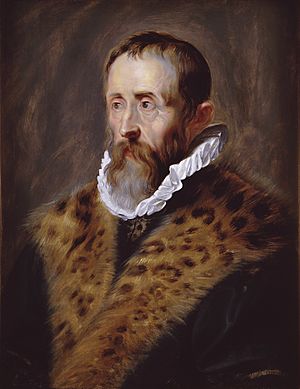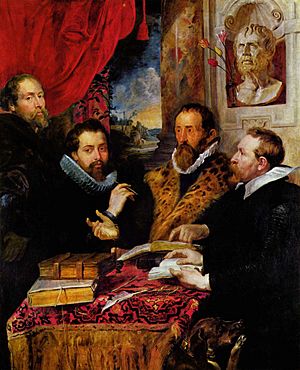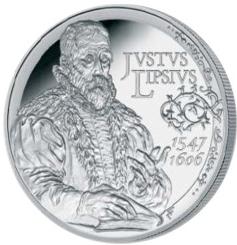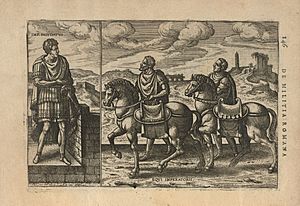Justus Lipsius facts for kids
Quick facts for kids
Justus Lipsius
|
|
|---|---|
 |
|
| Born | October 18, 1547 |
| Died | March 23, 1606 (aged 58) |
| Alma mater | Catholic University of Louvain |
|
Notable work
|
De Constantia (1583) |
| Region | Western philosophy |
| School | Neostoicism |
| Institutions | Leiden University (1578–1591) |
| Notable students | Erycius Puteanus |
|
Influences
|
|
Justus Lipsius (also known as Joest Lips or Joost Lips) was an important scholar from Flanders. He was born on October 18, 1547, and died on March 23, 1606. Lipsius was a philologist, which means he studied languages and ancient texts. He was also a philosopher and a humanist. This means he believed in the value of human beings and used classical studies to improve society.
Lipsius wrote many books to bring back ancient Stoicism. Stoicism is an old philosophy that teaches people to be calm and strong, especially during tough times. He made sure his ideas fit well with Christianity. His most famous book is De Constantia, which means On Constancy. His version of Stoicism, called Neostoicism, had a big impact on many thinkers of his time. He taught at universities in Jena, Leiden, and Leuven.
Contents
Early Life and Studies

Justus Lipsius was born in Overijse, a town in what is now Belgium. When he was young, his parents sent him to a Jesuit school in Cologne. But they worried he might become a priest, so they moved him to the University of Leuven when he was sixteen.
In 1567, Lipsius published his first book, Variarum Lectionum Libri Tres. This book was about different readings of ancient texts. Because of this work, he got a job as a Latin secretary for Cardinal Granvelle. He went with the cardinal to Rome and stayed there for two years. During this time, he studied old Latin writings, collected ancient inscriptions, and looked at old manuscripts in the Vatican Library.
After returning from Rome, he published another book in 1575, Antiquarum Lectionum Libri Quinque. This book showed how much he had learned. He moved from just guessing how to fix old texts to using careful comparisons of different versions to make them accurate.
Academic Career and Teachings
In 1570, Lipsius traveled through different parts of Europe, including Germany and Austria. He taught at the University of Jena for over a year. To teach there, he had to agree with the Lutheran Church. On his way back to Leuven, he stopped in Cologne. Here, he acted as a Catholic.
He went back to Leuven, but the Eighty Years' War soon forced him to leave. This was a long war in the Netherlands. He found safety in the Northern Netherlands, where the new University of Leiden hired him as a history professor in 1579. He was the head of the university (called the rector) four times. He helped the university grow and develop a lot in its early years.
The eleven years Lipsius spent in Leiden were his most productive. During this time, he prepared his works on the Roman philosopher Seneca. He also improved his writings on the Roman historian Tacitus through many new editions. He published many other works too. Some were pure academic studies, some were collections from classical writers, and others were for a general audience.
One of his important works was a book about politics, published in 1589. In this book, he wrote that a government should only allow one religion. He suggested that differences in religion should be dealt with very strongly. This idea caused some trouble for him. However, the university leaders in Leiden helped him. They convinced him to say that his phrase Ure, seca (meaning "Burn and cut") was just a metaphor for taking strong action, not actual violence.
Later Life and Legacy
In 1590, Lipsius left Leiden and went to Mainz. There, he officially rejoined the Roman Catholic Church. This was big news in the Catholic world. He received many invitations from universities and royal courts in Italy, Austria, and Spain. But he chose to stay in his home country. He finally settled in Leuven, where he became a professor of Latin at the Collegium Trilingue. In 1591, he traveled through France, Italy, and Germany with his young friend Jacob Dircksz de Graeff.
He was not expected to teach much. He also became a privy councillor (a royal advisor) and the official historian for King Philip II of Spain. These jobs added to his small salary. He kept publishing his writings. His main works from this period include De militia romana (1595), about the Roman army, and Lovanium (1605), a description of Leuven. This last book was meant to be an introduction to a larger history of Brabant.
Justus Lipsius died in Leuven when he was 58 years old.
The Justus Lipsius building in Brussels is named after him. This building used to be the main headquarters for the European Council and the Council of the European Union. It is still used by these important European groups.
In 2006, Belgium made a special 10 euro commemorative coin with his portrait on it. One of the main buildings at Leiden University, which houses the Faculty of Humanities, is also named after Lipsius.
Ideas on Government
The historian Gerhard Oestreich believed that Lipsius's ideas about the perfect citizen were very important. Lipsius thought an ideal person acts with reason, controls their feelings, and is ready to face challenges. These ideas were popular during the difficult times of the Protestant Reformation.
Oestreich suggested that Lipsius's views helped shape how governments were organized. This included the idea of a strong ruler and strict rules for citizens. It also influenced how armies were built and trained. These ideas might have helped lead to big changes in European warfare and how countries were run. However, some scholars do not fully agree that Lipsius's political ideas had such a strong impact on the Dutch Republic.
Works
- Variarum Lectionum Libri Tres (1567)
- De Constantia Libri Duo, Qui alloquium praecipue continent in Publicis malis (1584)
- Politicorum sive Civilis Doctrinae Libri Sex (1589)
- De militia romana (1595)
- Admiranda, sive de Magnitudine Romana Libri Quattuor (1598)
- De bibliothecis syntagma (1602)
- Manuductionis ad Stoicam Philosophiam Libri Tres, L. Annaeo Senecae, aliisque scriptoribus illustrandis (1604)
- Diva Virgo Hallensis. Beneficia eius et miracula fide atque ordine descripta (1604)
- Annaei Senecae Philosophi Opera, Quae Exstant Omnia, A Iusto Lipsio emendata, et Scholiis illustrata (1605)
- Lovanium, sive Opidi et Academiae eius descriptio (1605)
- Monita et exempla politica (1605)
See also
 In Spanish: Justo Lipsio para niños
In Spanish: Justo Lipsio para niños
- Erycius Puteanus, one of his students
 | Frances Mary Albrier |
 | Whitney Young |
 | Muhammad Ali |



